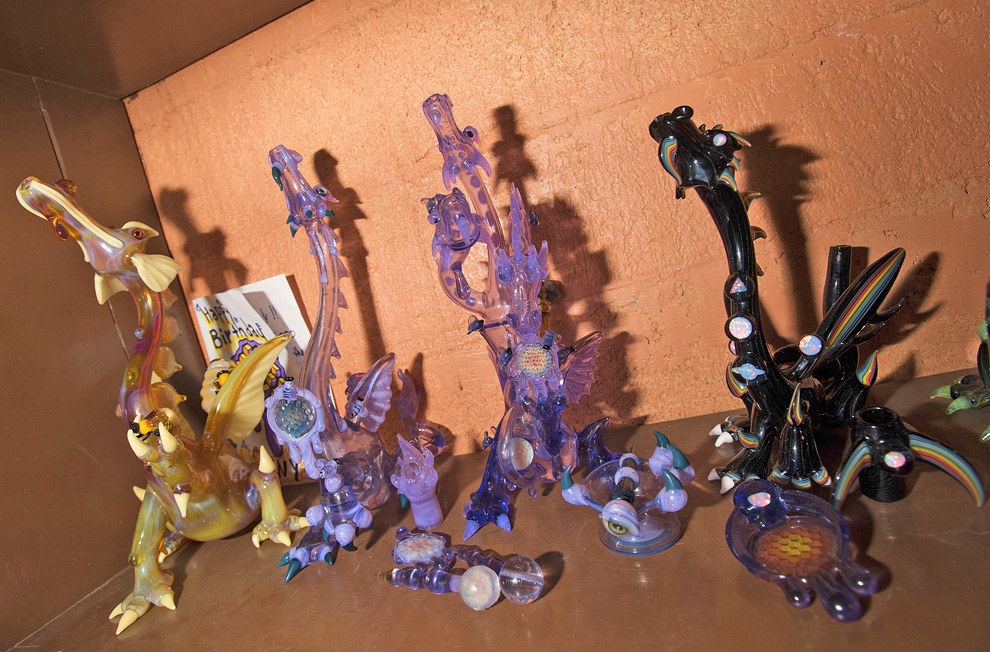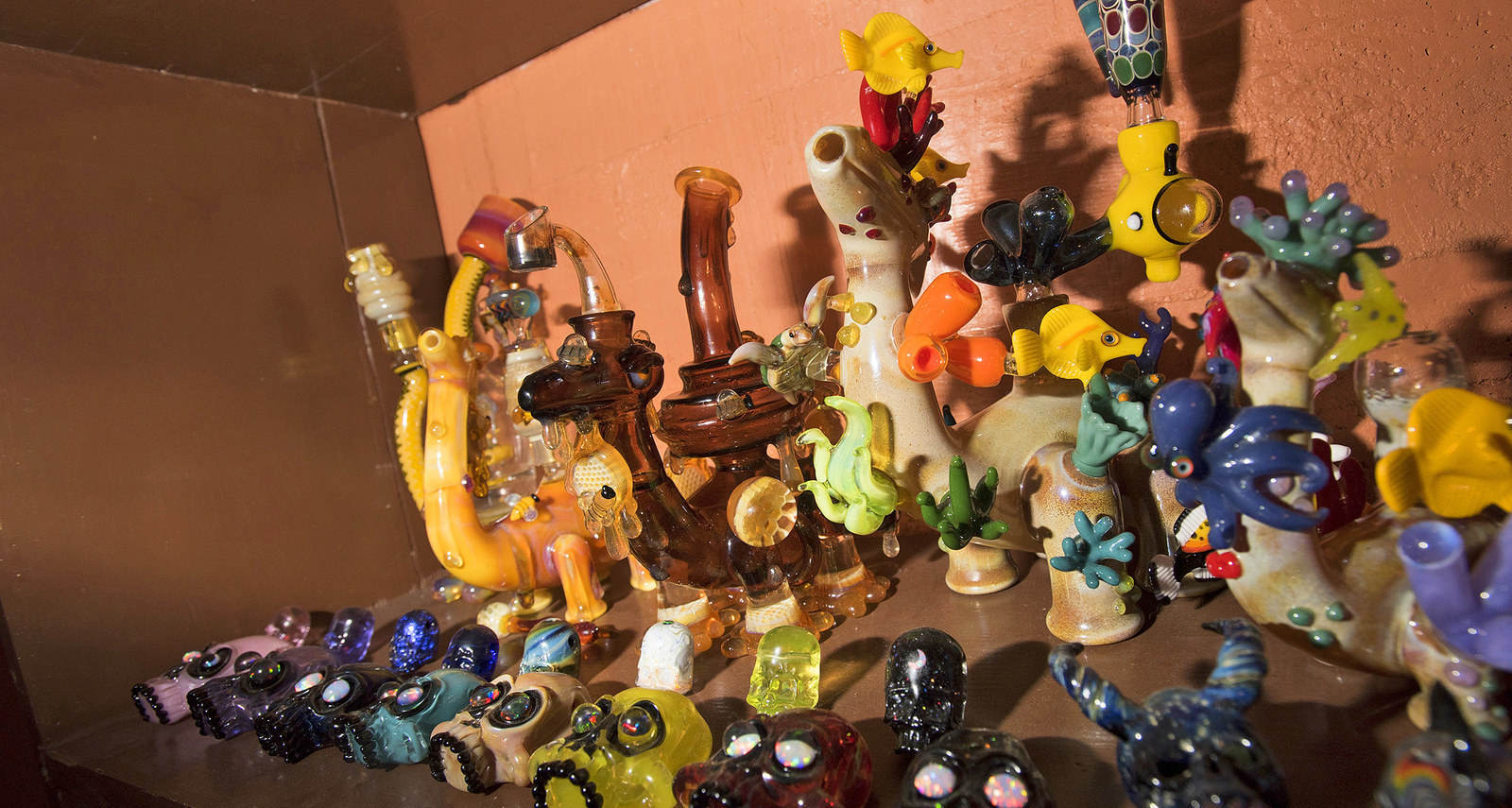Past the sports cars in the driveway, down the stairs of what was once Shirley Temple’s mansion in Beverly Hills, in a vault originally designed to be a wine cellar, there is a collection of bongs worth half a million dollars.

The proud owner, 21-year-old Kenny Kemp, is sole heir to hundreds of millions of dollars and a passionate stoner whose support of the functional glass art industry provides a needed infusion of legally acquired money. On a warm evening in the middle of January, Kemp handed out bottles of water and offered his guests the opportunity of a lifetime: to take hit after hit of hash oil off of one-of-a-kind glass pipes worth tens of thousands of dollars each.
The skyrocketing value of glass pipes isn’t simply a result of smokers and dealers’ red-eyed awe at their growing complexity and beauty. Selling marijuana is easier than it used to be, but it’s still pretty hard. Even if you manage to coax the dankest resin out of your female plants, grease the palms of whoever is controlling your state’s cannabis licenses, and build up a loyal customer base, you can’t legally do much with your rapidly accumulating stacks of cash. Not in Colorado, not in Washington, not anywhere. As long as the federal government considers the drug illegal, most banks don’t want to go anywhere near legal pot profits, because even state and community banks in places where the drug is recreationally or medically legal are licensed and overseen by federal institutions.
More than simply works of art, status-affirming trophies, or ways to get high, custom glass pipes have become ways for marijuana entrepreneurs shut out of legitimate financial institutions to invest their otherwise untouchable cash.
Most transactions involving bongs and rigs, which look like bongs but are used for vaporizing concentrates, happen off the books, among friends, at trade shows, or between connoisseurs who meet online. Then, anyone who paid five figures for a pipe using drug money, including dealers in states where weed is very illegal and businessmen in states with medical or recreational cannabis laws, can resell the same pipe with all of the appropriate receipts, paperwork, and taxes. Presto, change-o: Now the money is clean.
“You can use [glass] to launder money,” said one California businessman who deals in marijuana concentrates, showing BuzzFeed News his collection. “You go to a gallery, see something for thirty thousand bucks, make a deal, and then sell it off and just make a stipulation that whoever pays you pays with a check. I could trade half of these pipes within a day or two, if I wanted to.”
(Due to the quasi-legal nature of their businesses and financial practices, almost all of the marijuana merchants interviewed for this story asked to be anonymous.)
Unlike flashy cars or mansions, pipes are subtle, keeping nosy neighbors unaware of your growing wealth. Plus, the value of glass can fluctuate dramatically, making it easier to conceal what’s really happening. Some pieces worth $2,000 just a few years ago are now worth $10,000.
"A lot of people like to buy up glass companies because it's really hard for the government to see, to understand it,” said Phil Martin, one of the partners who runs Moxie 710, an L.A.-based seeds and extracts company. “They don’t understand that you can buy glass really cheap and then sell it for a high price — they just don’t understand it — so it's a lot easier for people to put their money in there, launder it, and get it legally back out of the glass company. And that happens a lot."

Kemp has an extensive, legally paid for collection of pipes, pendants, marbles, and tubes featuring psychedelic swirls, fantastical creatures, skulls, and nostalgic references to Nintendo characters. When you’re hanging out in his mother’s basement, you can smoke out of a black Glock, a bear shaped like a honey container, or a monkey in a suit smoking a cigarette and holding a banana like a gun.
But Kemp acknowledges that he’s not the typical customer when it comes to five-figure pipes, in that he doesn’t work in the weed industry.
“The demographic that does buy [glass] usually has money that’s not the cleanest,” he said. “How are you not gonna spend a lot of money on [glass], when you have so much [cash]? Like how are you going to wash it out?”
Just as in cannabis itself, the market for pipes has changed considerably in the past few years alone. Back in 2011, a top glassblower named Scott Deppe told the makers of the pipe-art documentary Degenerate Art that the most expensive piece he’d ever sold had been $18,000. A few months ago, Deppe posted on his Instagram feed a green skull pipe covered in gold-encrusted pot leaves priced at $100,000.
“If you did that five years ago, people would think you were fucking crazy,” said Jordan Moezinia, who owns the Honeydrop Glass Gallery in Los Angeles. “Now, somebody will buy it.”
Not every marijuana dealer thinks spending tens of thousands of dollars on an ornate pipe is a worthy investment. One California dispensary owner had never heard of the practice of collecting glass as assets, and rolled his eyes when he heard about it.
“I try to invest excess money back into my business,” he said. “Don’t the rigs lose value when they start getting used? Is there insurance for these things?”
He described a few friends who were laundering their money through legitimate small businesses, including a sandwich chain and a winery, and then shook his head again at the thought of putting so much cash into a smoking device, adding that some people in the marijuana industry simply have “spending problems.”
In addition to widespread legalization of medical and recreational pot, a few recent developments helped inflate the value and popularity of bespoke smoking devices. First, Instagram and social media made it possible for prominent glass artists to build hype around their products beyond the tight-knit circle of established cannabis growers and dispensary owners.
The growing popularity of hash oil and other concentrated forms of marijuana, which required new tools and equipment, also stimulated demand and innovation in the glass market. Some of the extraction artists who produce hash oil on the West Coast told BuzzFeed News that by 2012, they were pulling in tens of thousands of dollars a month.
Soon, an informal underground pipe economy had sprung up adjacent to the cannabis market.
“There’s some people that [buy glass] to make money,” one Miami-based extraction artist said. “[I have] friends who bought a piece for $15,000 and walked out the door and had an offer for $35,000. Some people smoke out of it for two months and then sell it and make double their money.”
Marijuana is still illegal under federal law, so the fate of state-level experiments with legalization is still in question. The feds are letting legalization go forward for now, but the current truce between the feds and the states might not last. President Obama’s nominee for Attorney General, Loretta Lynch, has already declared that she doesn’t support legalization. Depending on who wins the White House in 2016, many bankers believe the current, relatively permissive environment toward legal weed could quickly come to an end.
So in the meantime, high-end glassblowers find themselves in an oddly crucial position, manufacturing a form of gold bullion for the cannabis industry.
Cannabis banking consultant Paula Givens said that “capital expenditures” like these are one of several necessary but legal workarounds for marijuana businesses facing a lack of banking options.
“[These are] the extremes that cannabis business owners have to go through in order to utilize their legitimate revenue,” Givens said. “Convincing the banks of their ability to service cannabis consistent with their BSA/AML (Bank Secrecy Act/Anti-Money Laundering) obligations has been far more difficult than getting a buy-in from the cannabis industry.”
Although several Colorado and Washington marijuana dispensaries will accept credit card charges from customers, they are only able to do so by miscoding the transactions. Other pot shops are processing debit card purchases through something called cashless ATMs, which can avoid federal detection by classifying the money spent on cannabis as an ATM withdrawal. Which makes a six-figure bong a safer investment than it sounds, especially since the feds don’t seem to care about pot paraphernalia like they used to.
“It’s a lot better than having $12,000 in cash,” one California ganjapreneur told BuzzFeed News, when showing off one of his favorite pieces.
In the 12 years since actor Tommy Chong was arrested as part of Operation Pipe Dreams, a raid on 55 bong traffickers, the glassblowers who dominate the cannabis paraphernalia industry have sunk to a very low priority for the Department of Justice.
“I don’t think marijuana paraphernalia is taken nearly as seriously by law enforcement as it was at once time,” said D.C.-based lawyer Keith Stroup, founder of the National Organization for the Reform of Marijuana Law. “It used to be the advice all of us lawyers were told we should give our clients was, ‘If you’re going to sell pipes and papers then you have to have a sign out front that prominently says, ‘To be used only for tobacco or legal products,’…but it’s been a long time since I’ve had one of those calls.”
It helps that, according to Drug Enforcement Agency Special Agent Matt Barden, weed businesses operating in states where medical or recreational marijuana has been legalized are under far less scrutiny than they used to be. Barden said he hadn’t heard anything about money being laundered through bongs.
“If an entity within the state of Washington, for example, is abiding by the rules, I wouldn’t say they’re off our radar — you always have to make sure they continue to do the things they’re supposed to do — but [we won’t] have a full investigation launched against them,” he said.
Plus, because the most expensive pipes are unique, and the cannabis industry is a very small world, glass can’t easily be stolen and resold. There are only so many interested buyers and venues to sell through, and someone will undoubtedly recognize a custom piece, so the size of the community serves as a sort of insurance on your investment. (The same quality could also be incriminating, so most marijuana industry collectors asked BuzzFeed News to avoid describing the details of their best pipes.)
Of course, most canna-businesses would prefer not to keep their wealth in the form of glass, but even the semi-legitimate banking options that have emerged in the past year or two have proven unstable at best and illegal at worst.
Anticipating legalization in the next decade, a handful of services and consultants like Givens have popped up in the past year attempting to parse the Treasury Department’s 2014 memo on how marijuana businesses can comply with federal regulations.
Givens, a former trial attorney from St. Louis, developed a risk management program to help banks and marijuana businesses work together to follow the new rules. She said many ganjapreneurs would like to comply but are not willing to put forth the effort necessary to do so, especially when it comes to keeping meticulous records.
Most financial institutions remain rightfully wary. According to Amanda Averch of the Colorado Bankers Association, the Treasury Department’s guidance actually made it more difficult for banks to accept cannabis money, and most Colorado banks that have done so have been forced to close those accounts.
“We see this as a very concerning public safety issue. It’s not if there’s going to be an incident but when,” Averch said. “It could be a robbery, who knows? There’s a lot of money in these businesses, and we don’t know how these people are safely storing it.”

